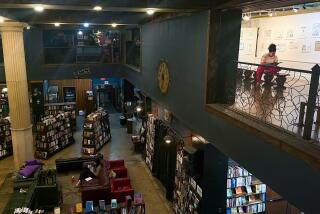Leonard Riggio, who forged a bookselling empire at Barnes & Noble, dies at 83

- Share via
NEW YORK — Leonard Riggio, a brash, self-styled underdog who transformed the publishing industry by building Barnes & Noble into the country’s most powerful bookseller before his company was overtaken by the rise of Amazon, has died at age 83.
Riggio died Tuesday “following a valiant battle with Alzheimer’s disease,” according to a statement issued by his family. He had stepped down as chairman in 2019 after Barnes & Noble was sold to the hedge fund Elliott Advisors.
“His leadership spanned decades, during which he not only grew the company but also nurtured a culture of innovation and a love for reading,” reads a statement from Barnes & Noble.
Riggio’s near-half-century reign began in 1971 when he used a $1.2-million loan to purchase Barnes & Noble’s name and its flagship store on lower Fifth Avenue in Manhattan. He acquired hundreds of new stores over the next 20 years and, in the 1990s, launched what became a nationwide empire of “superstores” that combined a chain’s discount prices and massive capacity with the cozy appeal of couches, reading chairs and cafes.
“Our bookstores were designed to be welcoming as opposed to intimidating,” Riggio told the New York Times in 2016. “These weren’t elitist places. You could go in, get a cup of coffee, sit down and read a book for as long as you like, use the restroom. These were innovations that we had that no one thought was possible.”
By the end of the 1990s, an estimated one of every eight books sold in the U.S. were purchased through the chain, where front table displays were so valuable that publishers paid thousands of dollars to have their books included. Thousands of independent sellers went out of business even as Riggio insisted that he was expanding the market by opening up in neighborhoods without an existing store. Instead, independent owners spoke of being overwhelmed by competition from both Barnes & Noble and Borders Book Group, the rival chains sometimes setting up stores in close proximity to each other and to the locally owned business.
Barnes & Noble became so identified as an overdog that one of the 1990s’ most popular romantic comedies, “You’ve Got Mail,” starred Tom Hanks as an executive for the “Fox Books” chain and Meg Ryan as the owner of an endangered independent store in Manhattan.
“We are going to seduce them with our square footage, and our discounts, and our deep armchairs, and our cappuccino,” Hanks’ character confidently declares. “They’re going to hate us at the beginning, but we’ll get ’em in the end.”
The internet shifts bookselling
Riggio began the 2000s at the height of power, with more than 700 superstores and hundreds of others outlets. But internet commerce was growing quickly and Barnes & Noble, with its roots in physical retail, lacked the imagination and flexibility of the startup from Seattle that called itself “Earth’s Biggest Bookstore,” Amazon.com. The online giant launch in 1995 by Jeff Bezos gained business throughout the 2000s and by the early 2010s had displaced Barnes & Noble through such innovations as the Kindle e-book reader and the Amazon Prime subscription service.
Bezos would liken himself to David taking down Goliath, although the contrast between the leaders also had the feel of one of Aesop’s fables: The muscular, mustachioed Riggio, a boxer’s son, upended by the quick and clever Bezos.
“We’re great booksellers; we know how to do that,’’ Riggio acknowledged to The Times in 2016. “We weren’t constituted to be a technology company.”
Leonard S. Riggio was the eldest son of a prize fighter (who twice defeated Rocky Graziano) turned cab driver and a dressmaker. Even in childhood, he advanced quickly, skipping two grades and attending one of the city’s top high schools, Brooklyn Tech. He studied metallurgical engineering at New York University’s night school before focusing on commerce, and by day absorbed the bookselling world and the rising cultural rebellion of the 1960s.
Riggio and the independent community may have seemed to hold opposing values, but they shared a love of reading and the arts and a liberal political outlook. He was a generous philanthropist and a prominent supporter of Democratic politicians. He was even friendly with the consumer activist and presidential candidate Ralph Nader, who featured Riggio, Ted Turner and Yoko Ono among others in his 2009 novel “Only the Super-Rich Can Save Us!”, in which Nader imagines a progressive revolution from above.
“Ever since he was a boy from Brooklyn, he’d had a visceral reaction to the way workings stiffs and the poor were treated on a day-to-day basis,” Nader wrote of Riggio, who did at times stand apart from other his management peers. When some 200 business leaders were questioned by Fortune magazine in the 1990s about their political ideas, only Riggio supported the raising of worker pay.
“Money can become a burden, like something you carry on your shoulders,” he told New York magazine in 1999. “My nature is to be a ball-buster, but my role is to help people.”
Italie writes for the Associated Press.
More to Read
Inside the business of entertainment
The Wide Shot brings you news, analysis and insights on everything from streaming wars to production — and what it all means for the future.
You may occasionally receive promotional content from the Los Angeles Times.










